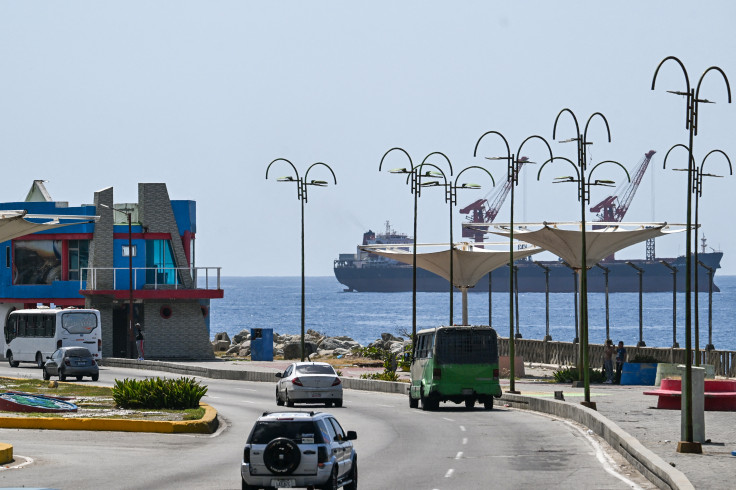
Venezuelan President Nicolás Maduro on Tuesday condemned U.S. President Donald Trump after American warships carried out a deadly strike on a vessel that had departed Venezuela, killing 11 people in what Washington described as an anti-drug operation.
Maduro accused the Trump administration of escalating toward war and dismissed U.S. claims that the boat was tied to the Venezuelan criminal group Tren de Aragua. "Venezuela is facing the greatest threat seen in our continent in 100 years," Maduro said in a fiery press conference. "Eight warships, with 1,200 missiles and a nuclear submarine, are targeting Venezuela. It is an extravagant, immoral and bloody threat. If Venezuela is attacked, we will declare ourselves in armed struggle and a Republic at arms."
He also rejected U.S. allegations linking him personally to narcotrafficking. "If they are looking for a mafia boss, they should look elsewhere," he said.
Venezuelan President Nicolás Maduro says the U.S. military presence in the Caribbean is “the greatest threat the continent has seen in 100 years,” calling the deployment of warships and missiles “unjustifiable" and "criminal.”
— CBS News (@CBSNews) September 2, 2025
He warned that if Venezuela were attacked, the… pic.twitter.com/JC4zP3GJSb
Trump Confirms Deadly Operation
Earlier in the day, Trump confirmed the strike in a message on his social media platform, Truth, calling the action a "kinetic attack" ordered under his authority. "This morning, under my orders, U.S. Armed Forces carried out a kinetic strike against individuals identified with certainty as narcoterrorists of the Tren de Aragua," Trump wrote.
"The attack resulted in 11 terrorists killed in the operation. No U.S. soldiers were hurt. Let this be a warning to anyone even considering sending drugs into the United States. Beware," he added.
Speaking from the Oval Office, Trump told reporters he had been briefed by Joint Chiefs Chairman Gen. Dan Caine before the operation. "We just opened fire on a boat, a boat that was carrying drugs, a lot of drugs," Trump said. "These were coming from Venezuela."
Please let this serve as notice to anybody even thinking about bringing drugs into the United States of America. BEWARE! pic.twitter.com/6LWxXTKI2w
— The White House (@WhiteHouse) September 2, 2025
U.S. Justifies Naval Deployment
The U.S. Navy maintains a flotilla in the southern Caribbean near Venezuelan waters, including three guided-missile destroyers — the USS Gravely, USS Jason Dunham and USS Sampson — along with submarines, surveillance aircraft, and amphibious ships such as the USS San Antonio, USS Iwo Jima and USS Fort Lauderdale.
The Pentagon said the strike and the ongoing deployment are part of a strategy to disrupt Latin American cartels, which Washington blames for fueling fentanyl and cocaine flows into U.S. cities.
Secretary of State Marco Rubio echoed Trump's announcement, calling the strike "a lethal operation against a drug trafficking boat that had departed Venezuela and was being run by a designated narcoterrorist organization."
Rising Tensions With Caracas
The strike is the most serious confrontation yet in the standoff between the Trump administration and Venezuela since the Republican returned to the White House. Earlier this month, Trump secretly signed a directive authorizing military force against cartels declared terrorist organizations, according to The New York Times.
The White House also announced a $50 million reward for information leading to Maduro's arrest, accusing him of heading the so-called Cartel of the Suns, a network allegedly involving senior Venezuelan officials and linked to Colombian guerrillas and Mexican traffickers.
Maduro has ordered Venezuelan troops to mobilize and called on militias and volunteers to prepare for a possible foreign intervention. "If Venezuela is attacked, we will not hesitate to defend our sovereignty," he said.
A Flashpoint in the Caribbean
With U.S. destroyers patrolling near Venezuelan waters and Maduro vowing armed resistance, the strike underscores the danger of a wider confrontation in the Caribbean.
White House spokesperson Karoline Leavitt said last week that the United States is ready to use "all elements of its power" to halt drug trafficking and bring those responsible to justice.
For Maduro, the attack represents what he called "maximum pressure military escalation." For Trump, it was a demonstration of strength. The clash leaves the region bracing for what could become one of the sharpest U.S.-Venezuela confrontations in decades.
© 2025 Latin Times. All rights reserved. Do not reproduce without permission.






